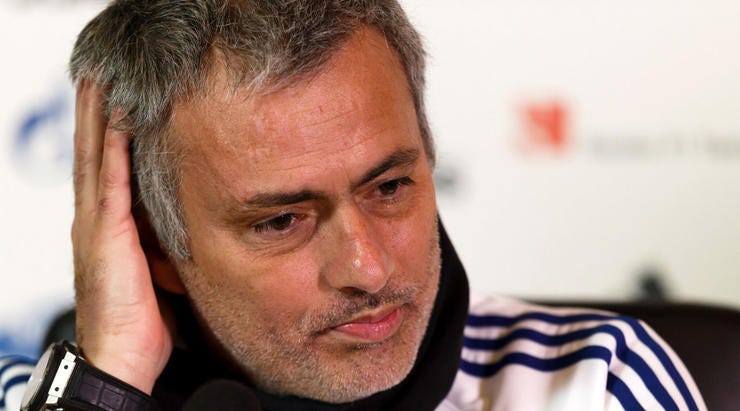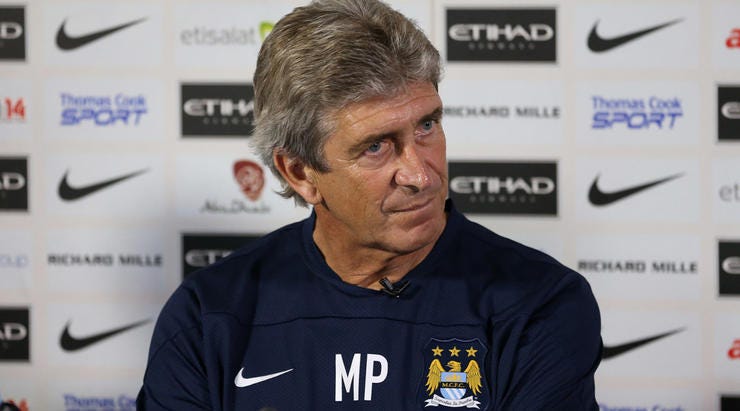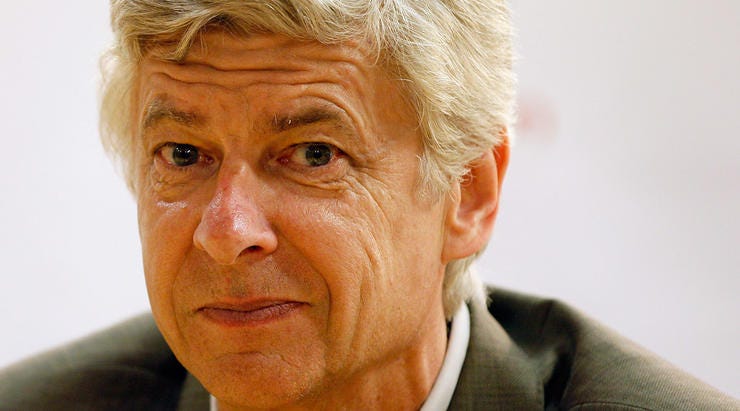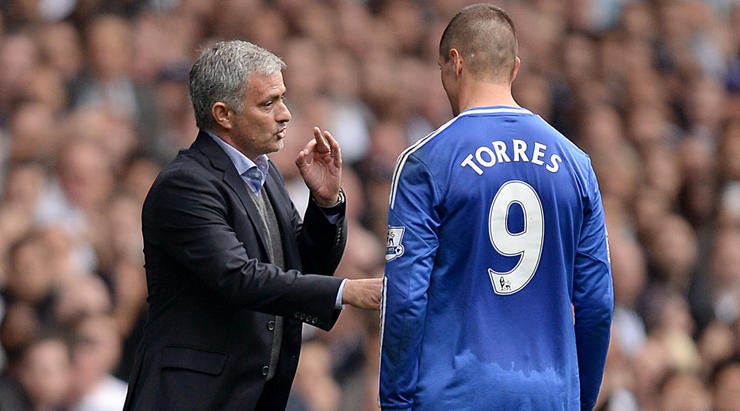You’re not fooling anyone, Jose: Mourinho, the media and his ‘mind games’
Picking apart the Portuguese’s recent media meddling…
Jose Mourinho’s leaked comments about his own strikers brought to mind a line from Elvis Costello’s fittingly named Accidents Will Happen: “Your mouth is made up but your mind is undone.” The gurning New Wave specs-wearer may not have wanted to go to Chelsea, but the Portuguese gaffer can’t exactly have skipped into training at Cobham after a few loose-lipped comments caused a media feeding frenzy.
Mourinho’s most-repeated soundbite this week was unusual in that it was unintended. The Portuguese has long enjoyed spoon-feeding journalists their headlines, but he was horrified to find that French media had released what he thought were unrecorded opinions on his side’s lack of firepower.
“I have a team but no striker,” he said. “The problem at Chelsea is that we are lacking a goalscorer. I have one [Samuel Eto’o] but he is 32, possibly 35, who knows?”
The offhand remarks were delivered smilingly (in French) to the owner of Swiss watch manufacturer Hublot, Mourinho apparently unaware that he was already being recorded by Canal Plus. The French TV station were due to interview him later that afternoon — and got good quotage on the record when the Portuguese dropped heavy hints about signing Monaco striker Radamel Falcao.
But the bigger story was his earlier pronunciations on his existing strike force — the apparent denigration of Fernando Torres and Demba Ba, and the mocking of Eto’o. For once the soundbite bit him back, and he was suddenly hacked off.
“I think you should be embarrassed as a media professional,” said Mourinho when asked about the story in his next press conference. “To record a private conversation and make it public… from an ethical point of view, it’s a real disgrace.”
Feeding the media lines
Mourinho was quick to insist he had a strong relationship with Eto’o, pointing out that the Cameroonian was one of few players he had re-signed after moving to a different club (others include Michael Essien, Ricardo Carvalho and Paulo Ferreira).
Furthermore, it’s not as if Mourinho hasn’t mentioned Chelsea’s lack of firepower before; the previous Saturday, after it took 93 minutes to score past Everton at Stamford Bridge, he had accepted that “obviously we have some limitations”. But what must have hurt Mourinho is that the media — initially in France, but rapidly thereafter across Europe — were so keen to exploit his unguarded comments… and that he was quite so cavalier about discussing his players with strangers.

The furore came after an apparent escalation in Mourinho’s public comments about rival managers — ‘mind games’, as the media meme has it.
First he took on Manuel Pellegrini. The Manchester City manager had reacted to the 1–0 league defeat at the Etihad by saying that Chelsea were “the team that spends the most money this year”; in response, Mourinho wondered whether the qualified engineer needed a “calculator”, running through Chelsea’s January dealings to see that “55 [million pounds recouped] minus 32 [million pounds spent] is 23. So Chelsea, in this transfer window, generated £23m.”
Four days later, he reacted again to an Arsene Wenger comment that managers of top clubs underplaying their title chances suffer from a “fear to fail”. Mourinho labelled the Frenchman a “specialist in failure” after eight trophyless seasons. It was a witty but low blow that evinced a long sigh from Wenger.
“I am embarrassed for him,” the Arsenal manager told the expectant press pack. “I am more disappointed for Chelsea than for me. I don’t want to get into those silly disrespectful remarks.”
Taking the rise or taking the bait?
In both these instances, Mourinho was reacting to another manager’s comments; in the Pellegrini example, he didn’t even wait for a tee-up question from the media, tearing straight into the Chilean he had succeeded at Real Madrid. So is he taking the bait rather than taking the rise?
Mourinho “craves the role of underdog,” writes Mirror Football’s Nooruddean Choudry. “The Portuguese seems to have an inside-out reality distortion field that distills even the vaguest of statements into a personal slight. Resentment fuels him and gives him something, or someone, to rail against.”
But does it work? Alex Ferguson was widely held to be the master of mind games and the siege mentality, and his many trophies have been held as evidence of his success at soundbites. The most famous was Kevin Keegan’s 1996 “I would just love it” speech — but as ESPNFC’s Rory Smith notes, “Newcastle had already lost their previous three games. The collapse was in motion before the Scot opened his mouth.”

Another notable example chalked up to Caledonian cunning was Rafa Benitez’s “list of facts” in January 2009. Ferguson had claimed Liverpool could blow their lead at the top of the table, and that United had been “handicapped by the Premier League” fixtures.
Benitez responded with a five-minute critique of Ferguson’s attitude to authority, referees and, yes, mind games. United did eventually win the title, but not particularly because Benitez “cracked” — his speech was calmly enunciated, his team going on to win 12 of their remaining 18 games — but because United went on a startling run, culminating in the collection of 22 points from the last 24 available.
So does it work?
For all the perceived psychological success and unquestionable trophy haul of Ferguson and Mourinho, routinely described as the masters of mind games, the raised guns can backfire. It’s worth noting that Chelsea lost their first game after Mourinho’s dual duels with Pellegrini and Wenger — back at Man City in the FA Cup. It may not be the Portuguese’s main target trophy of the season, but he seemed deflated by his team’s flat performance.
Indeed, since Mourinho first bit back at Pellegrini, Chelsea have only won one in four, thanks to that late winner over Everton. And there is a precedent for it. As FourFourTwo’s James Maw tweeted, “Chelsea lost the two games after Mourinho called Wenger a ‘voyeur’ in 2005; Arsenal won six in a row.”
Moreover, by reacting to other managers’ words, Mourinho runs the risk of seeming petulant — no matter how amusing the riposte or eager the media to report it. As Smith says, “You have the broadside from Manager A and the reaction from Manager B. It is rare that Manager B can win because if he reacts angrily, he will be told that Manager A has got under his skin.

“If he dismisses it, he can — at best — hope to be portrayed as not rising to the bait, a sort of no-score draw. There is always a chance, though, that his refusal to engage will be seen as a sign of weakness.”
Mourinho has rarely been the one to back down, even if he later regrets it — even in the heat of the recent Wenger argument, he was careful to reiterate that “I’m very sorry, so sorry” about the voyeur comments — and his adversaries have tried to draw a line under the affairs.
“I answered just one time to Mourinho because if you remain always in silence, you sound as if you agree with those things,” said Pellegrini. “But just one time I will speak, I will not continue every week talking about things that for me are not an important level.”
“I didn’t speak about him at all in my press conference and I have no more to say,” said Wenger. “Let’s focus on things that are worth it, on football.” Goaded by a gorged media pack to respond to Wenger, Mourinho simply declined to comment — to audible disappointment.
The fallout
The Portuguese is in the game to win trophies rather than friends, and despite the “happy one” line he fed to the media upon his return to Chelsea, he is willing to be unpopular — “I believe at the end of the day I’ll be seen as the ‘impolite guy’, the one who’s aggressive in his words” — and has long been prepared to deflect attention away from his players if it helps them.
This was true in his first Chelsea spell, and will be even more so now he sees himself as the ward of a young team — the “little horses” in the title race, as another notable February soundbite had it, starting a chain reaction of managers denying their team was the favourite — all fairly light-hearted until Wenger’s over-earnest “fear to fail” comment so provoked the Chelsea boss.
“I don’t play the hypocrite game, and I don’t say what is politically correct,” Mourinho told FourFourTwo earlier this season. “But just as I don’t play the hypocrite game, I don’t play mind games, either. I just say what I think I have to and if people analyse that as a mind game, that’s fine.”
That was said in a position of strength, early in his Stamford Bridge second coming. The season isn’t going badly: Chelsea top the Premier League with easily the best defensive record. And after the draw at Galatasaray which leaves the Blues easily the best-placed English team to progress to the Champions League quarter-finals, both Eto’o and Ba shrugged off any suggestion that they had been affected by the backstage remarks. Torres, for his part, scored his fourth goal in five European games this season.

It’s to be hoped that Mourinho continues to speak openly, at least on the record. It would be a pity if this urbane, intelligent character clammed up and became “media trained” in the modern sense of saying nothing of interest, or nothing at all. He wouldn’t be the first, or even the first this season: Juventus coach Antonio Conte recently went all omertà on the Italian media, and it hasn’t stopped the Old Lady streaking away again atop the Serie A table.
It’s hard to imagine, and not the best outcome: a milder Mourinho makes for a more mediocre media. He may have to stay on the right side of the line between loquacious and garrulous, but the gladiatorial Portuguese surely won’t sheathe his sword for long.
And in the end, they’re just words. Most people in football — managers, journalists and fans — are now wise enough to see “mind games” as not much more than benign spin. Nobody hearing the Chelsea manager deny his side’s title chances will have decided against betting on them or buying a ticket for an upcoming match. The striker comments won’t make Eto’o throw a strop or stop Mourinho seeking reinforcements in summer. And we’ll all keep watching, waiting for more accidents to happen.
Originally published by FourFourTwo on February 28, 2014.






